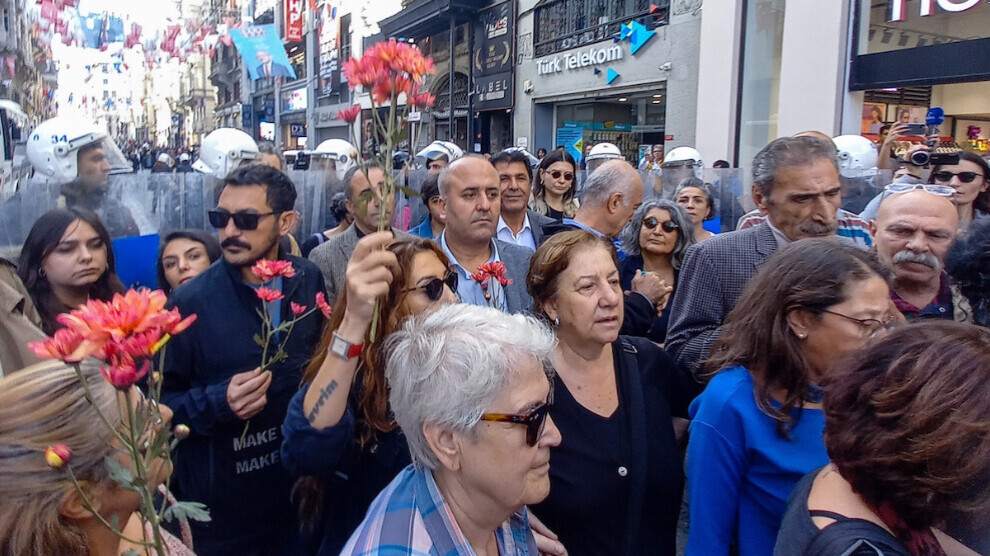26 detained in police attack on Saturday Mothers in Istanbul
The Saturday Mothers, who have been taking to the streets for their relatives who have disappeared in state custody for decades, were attacked by the police again.
The Saturday Mothers, who have been taking to the streets for their relatives who have disappeared in state custody for decades, were attacked by the police again.

The Saturday Mothers have once again been prevented by Turkish police from demonstrating in Galatasaray Square in Istanbul to draw attention to the fate of their relatives who disappeared in state custody and to demand punishment for the perpetrators. The women and their supporters were stopped on their way to their rally site, 26 people were detained and taken away with their hands tied behind their backs.
The Saturday Mothers were supported this week by well-known personalities, including lawyer Eren Keskin, the chairperson of the Human Rights Association (IHD), as well as the HEDEP (Peoples’ Equality and Democracy Party) MPs Cengiz Çiçek, Celal Fırat and Özgül Saki, TIP (Workers’ Party of Turkey) MP Ahmet Şık and the former HDP (Peoples’ Democratic Party) MP Musa Piroğlu.
While journalists were forcibly pushed back, the police also tried to prevent HEDEP MP Özgül Saki from going to the encircled relatives of the disappeared. Saki protested against the unlawful action of the police and was only let through after she warned against criminal consequences. Meanwhile, the demonstrating group threw carnations at the cordoned-off Galatasaray Square, vowing the continuation of the struggle for justice. Cengiz Çiçek, HEDEP MP and co-spokesperson of the HDK (Peoples' Democratic Congress), protested against the unlawful police assault and said that the Saturday Mothers represent the conscience of society and their consistent resistance deserves great respect.
For over 28 years, the Saturday Mothers have been demanding information about their relatives who have disappeared in police custody. It is the longest-running civil disobedience action in Turkey, which began on 27 May 1995 with the sit-in by the family of Hasan Ocak, a teacher murdered by torture. An estimated 17,000 people, including journalists, politicians and human rights activists, "disappeared" in Turkey in the 1980s and 1990s, mainly in the Kurdish regions. Often their bodies were dumped in secret mass graves on military bases, but also in rubbish dumps or in well shafts. Neither the police nor the judiciary have taken any measures to investigate the “unsolved murders”.
Since the 2013 resistance in Istanbul's Gezi Park, protests have been banned in the square in front of the Galatasaray High School. Only the Saturday Mothers were allowed to continue protesting here. But with the accusation of "closeness to the PKK", the initiative's 700th vigil was banned and violently dispersed on 25 August 2018. Since then, all protests in Galatasaray Square have been banned. But this is contrary to the right to freedom of assembly and demonstration, ruled the Turkish Constitutional Court on 22 February 2023, rejecting the ministry's objection that Saturday Mothers threatened the "protection of public order".
"Everyone has the right to take part in unarmed and peaceful assemblies and demonstrations without prior permission," says Article 34 of the Turkish Constitution, which the security authorities violated with their banning order for the forcibly dispersed Saturday Mothers' action in August 2018 and all subsequent ones. The blockade of the square is thus invalid, according to the ruling of the constitutional complaint, with which Maside Ocak Kışlakçı was successful. However, the Turkish Interior Ministry and the Istanbul authorities ignore the ruling and have been violently attacking the Saturday Mothers and their supporters every week for months.